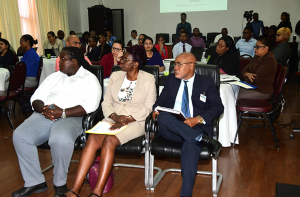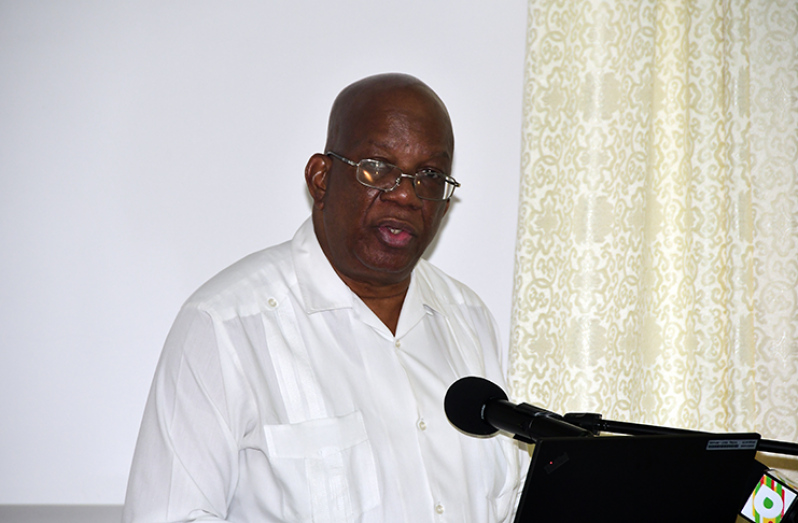-Finance Minister says gov’t taking steps to be prudent in expenditure management
By Navendra Seoraj
INTERNATIONAL financial institutions and local experts have projected that revenues from the local oil and gas sector will contribute to an increase in the country’s Gross Domestic Product (GDP), but Minister of Finance, Winston Jordan believes that the GDP number would not translate to improved livelihood without prudent management.
“Much has been said about the substantial growth spike that we expect from the inclusion of petroleum but those of you, who are economists, know that a GDP number does not automatically translate to improved livelihood for all our citizens,” said Minister Jordan, during his address to participants and officials at an International Monetary Fund (IMF) five-day training course and capacity-building exercise in Macro-economic Management for resource-rich countries, at the Arthur Chung Conference Centre, on Monday.
The minister said that it was for that reason experts have lobbied for developing countries to have a multi-dimensional measurement of development, given the inadequacies of GDP as an indicator of development and equity. History is replete with examples which demonstrate how per capita GDP increases do not translate to improved quality of life.
In talking about what the past examples reflect, Minister Jordan said: “These exemplify the consequences of both institutional weaknesses, weak resource governance structures, and the collective behaviour of the citizenry that, collectively, have worked to exacerbate the resource curse and Dutch disease.
“We have an opportunity to do better and to distinguish ourselves as a country that can learn from the experiences of others, and exercise greater responsibility to allow both present and future generations to be beneficiaries of good governance.”
With the hope of doing better than other oil-rich nations, he said the coalition A Partnership for National Unity and Alliance for Change (APNU+AFC) administration has taken deliberate steps to avoid the ‘resource’ curse – where several countries have spent funds long before first oil, in anticipation of future revenues. As opposed to those countries, Guyana has chosen to be prudent in its expenditure management.
Further, through the establishment of the Natural Resource Fund (NRF), government has established a “sound” governance structure that will see petroleum revenues being deposited directly into the Fund.
“We have designed the fund in a manner that accessing the funds is by way of a withdrawal rule. This rule is based on an analysis of both the oil and non-oil sectors,” said Minister Jordan, adding that it will prevent oil price volatility from entering the economy, afford funding for national development priorities, and allow for interest-bearing investments to be made.
In this way, he believes the earnings from petroleum will benefit both present and future generations. The reporting and accountability criteria within the NRF Act meet the well-established Santiago principles for transparency and good governance.

In deploying an “arsenal” of policies and programmes, to address and mitigate the resource curse and expand the non-petroleum sectors, government continues to be in active partnership in an Inter-ministerial Working Group with the Guyana Manufacturing and Services Association on expanding agro-processing and wood processing sectors.
Later this year, government will be focusing on the services sector and tourism product development and will prioritise agriculture, since it remains important to ensuring food security and economic diversification across the ten administrative regions.
“We will strengthen our manufacturing and services sectors, so vital for ensuring global competitiveness; leverage our standing forests; design and implement investments in catalytic infrastructure, while ensuring a robust public investment management system; design strategic interventions in education to effect a performance-based approach to ensuring quality and equity; and focus on institutional strengthening activities across government,” said Minister Jordan.
While, he said, the list is by no means exhaustive, in combination with good governance and public financial management, those seven areas of focus are important to ensuring that the country emerges as a buoyant and diversified economy through the leveraging of its resource wealth to address the areas where we are resource poor.
KEY PLAYERS
“Make no mistake that you are key players in that story and I expect this and other training to which you have already been exposed, will serve to make you active shapers of a history of which we can all be collectively proud.
“The technical quality of your work, your research, your economic modeling, your ability to design systems to support stronger institutions, and your ability to lead effective implementation, must be what drives your work ethic,” said Minister Jordan, noting that the participants represent the generation of future thinkers and leaders who will support the management of the resource-rich country.
Being able to contribute to development requires young professionals to help in designing programmes in ways that are not inimical to macroeconomic stability.
“We must be able to recognize the actions the country needs to adopt, for example, to contain inflation and maintain a stable exchange rate, non-achievement of which can undermine our competitiveness in the non-oil sector. We must be conscious about the impact of the elements that contribute to Dutch disease and resource curse as a nation.
“Even as we are undertaking the rebasing of the gross national product (GDP), it is anticipated that improved methodologies would improve our ability to capture growth in the economy,” said Minister Jordan.
In that regard, he expressed his hope that the collective thinking that is inspired by the content of the ongoing IMF course, leads, subsequently, to well- researched and thought-out technical advice from the young professionals. Participants included professionals from the Bank of Guyana, the Ministry of Public Infrastructure, the Department of Energy and Ministries of Natural Resources and Agriculture.
Minister Jordan said human capacity building is a critical determinant within the formula for institutional strengthening. “It may seem almost surreal to be a country that is considered resource-rich, especially for those of us who have worked for decades fighting the good fight for additional resources and more concessional resources. “But even that definition of being resource-rich needs to be considered thoughtfully. Though we will be accessing petroleum revenues, we will be doing so cognizant of the substantial deficient in human capital resources,” said Minister Jordan.



.jpg)








